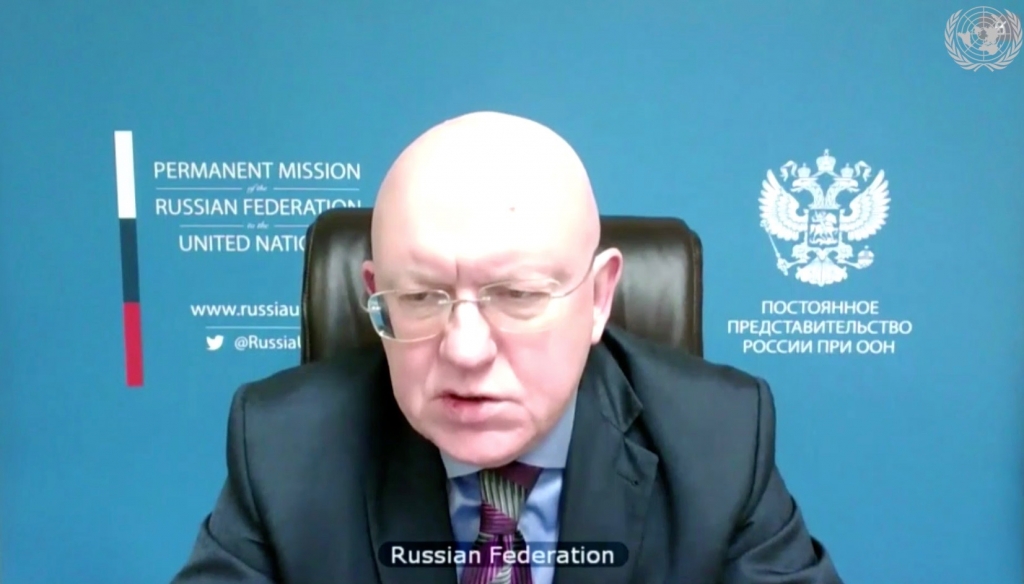Statement by Permanent Representative Vassily Nebenzia at an open VTC of UNSC members on the situation in Afghanistan
Mme. President,
We thank Special Representative of the Secretary-General and Head of UNAMA Ms. Deborah Lyons for her considerations and assessments of the situation in Afghanistan. We are firmly convinced that UNAMA plays an important role in coordinating international assistance to this country. We also thank Chairperson of the Afghanistan Independent Human Rights Commission Ms. Shaharzad Akbar for her statement. We welcome the participation in this meeting of Permanent representative of Afghanistan to the UN Ambassador Adela Raz.
Russia consistently supports the Afghan-led peace process. We have done much to promote national reconciliation and direct intra-Afghan dialogue.
On 18 March, Moscow hosted a regular meeting of the extended "Troika" comprising representatives of Russia, China, the US and Pakistan. The event was attended by representatives of the Afghan sides: the Government of the Islamic Republic of Afghanistan, Afghanistan’s High Council for National Reconciliation, prominent Afghan political figures, and leaders of the Taliban movement, as well as Qatar and Turkey as guests of honor.
Since the “Troika” was established in 2019, this mechanism has played a meaningful positive role. Last week, it once again proved relevant and highly demanded, as well as capable of boosting peaceful settlement.
The negotiations resulted in the extended “Troika” adopting a statement that put things into perspective and called on the sides to act flexibly. We expect that these results will be taken onboard by the Afghanis as they discuss substantive issues from their agenda in order to achieve the long-awaited progress of intra-Afghan talks.
Preserving regional consensus on peaceful settlement in Afghanistan remains a priority task. We stand for combining the efforts of the extended “Troika” and the Moscow Format which includes Afghanistan, all its neighbors and the United States. It was the Moscow Format that in November 2018 first brought together the Government of Afghanistan and the Taliban at one negotiations table.
Now it is vital to employ all opportunities for achieving political solutions and compromises in the interests of national reconciliation. We proceed from the need to consolidate all international and regional efforts. New initiatives should be thoroughly considered, and issues relating to their added value, agenda and modalities should be clarified.
Mme. President,
We have closely studies the recent UNSG report on the UN activities and efforts in Afghanistan.
We share the assessments about the unprecedented level of violence and toll amongst civilians, women and children in the first place. Unfortunately, throughout the years of war deadly terrorist attacks have become a sad routine for the Afghan people. Many of the large-scale attacks are the responsibility of ISIL. We see that despite numerous losses, the Afghan wing of ISIL did not abandon its regional plans and seeks to enhance capacity and spread the terrorist activity to the neighboring Central Asia.
The situation with the drug threat is also far from optimistic. Despite certain counter-measures taken by Kabul, the drug industry flourishes and provides “recharge” to terrorism. It remains a serious challenge for Afghanistan, the region, and the entire world. Against this backdrop, we are disappointed by UNODC delaying the publication of its regular report. This topic is under-covered in the SG report as well. Attempts to silence down or underestimate the presence and the scale of terrorist and drug threats in Afghanistan are unacceptable. We appreciate that Special Representative Lyons highlighted the topic of drug threat in her today’s briefing.
Afghanistan cannot cope with countering these challenges without support and assistance of the regional states, first of all its neighbors and the global community. Therefore, it is fundamentally important to engage the full potential of respectful mechanisms, first of all the SCO and the renewed SCO-Afghanistan Contact Group, as well as the CSTO. We will continue to provide help and assistance to our Afghan friends, i.a. in the framework of the Paris Pact Initiative.
Mme. President,
Let me conclude by saying that Russia has been Afghanistan’s friend and partner for many years, and we stand for establishing the long-awaited sustainable peace on this much-suffering land. To achieve this, Afghanis will need to work on a unifying platform. It is only them who can guide the peace process in Afghanistan. No scenarios must be imposed from the outside. As for the regional and international partners, they should be creating the necessary environment for negotiations and providing lasting political and economic support.
Thank you.
